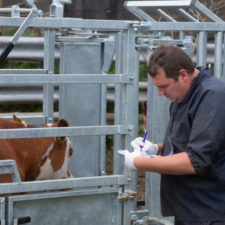Click here for a step-by-step guide on how the scheme works
Find out moreAdded 20 October 2021

The nation’s vets play an important role in Red Tractor’s assurance scheme. Not only helping farmers keep their animals safe and healthy, but also to meet the required standards and improve on-farm performance.
In doing so, vets help to uphold and protect the industry’s reputation as a world-leader in livestock production that’s traceable, safe and farmed with care.
At a time of ever-increasing scrutiny, preserving the public’s trust in British agriculture has never been more important. With our revised farm standards taking effect next month, from 1 November, we have sought to strike the delicate balance between protecting and promoting our members, reassuring consumers, as well as addressing changes in legislation and industry best practice.
As a core principle of Red Tractor, animal health and welfare has been enhanced, with welfare outcomes linked to standards for housing structures and cleanliness. We have also made it clearer what is and isn’t acceptable when handling animals.
We know that the relationship between vets and our livestock farmers is incredibly important. So, with the aim of helping to strengthening it, for our dairy, beef and lamb producers, we’ve introduced a requirement for a nominated vet to visit the farm at least once a year to see the livestock. Members need to have a livestock health plan and to record key welfare issues on farm, including the actions taken to reduce or control them. This plan must be reviewed, sign and dated by a vet every year. Quarterly vet visits are still the requirement for pig producers
New requirements for the dairy, beef and lamb sectors
Tethered housing systems for stock of any age, will not be permitted on Red Tractor farms as they restrict normal animal behaviour. In the short-term, derogations will be offered to the small number of members who are tethering their cattle. Tethering or restraining cattle for any other purpose will still be permitted, including for showing, milking and veterinary procedures.
A new standard with specific reference to administering analgesia for calves is being introduced after recommendations from the Farm Animal Welfare Council, the Ruminant Health & Welfare Group, and the British Cattle Veterinary Association.
We know it isn’t always possible to replace or reduce the need for some routine husbandry procedures on farms, so in view of existing BVA policies on the use of appropriate analgesia and anaesthetic to manage pain, we are requiring their use for beef and lamb animals. Cauterising paste can only be used on animals under one week of age and we now recommend that analgesia is used for beef calves. However, for dairy members it’s a full standard requirement.
New requirements for the pig and poultry sectors
On assured pig units, initial euthanasia training must now be carried out by a vet or via a Humane Slaughter Association course. Additionally, stockperson competency in euthanasia must be assessed by a vet every two years, rather than every three. The farm’s euthanasia policy must now also include contingency procedures and be signed by a vet, to confirm these are appropriate.
We also would like vets to recommend alternative disease control measures where possible, to minimise the prophylactic use of antibiotics on pig units. Members must now provide evidence to show why docking is needed, supported by a detailed quarterly veterinary review.
On assured breeder replacement and layer poultry units, using macrolide and fluroquinolone medication under veterinary direction must be a last resort, just as it already is on most Red Tractor poultry units.
All of the changes for Version 5 of Red Tractor’s standards have been shared with our farmer members, but it is vital that all farm vets are up-to-date and understand what’s changing and why.
If you see anything on site, please tell us
Vets play an important role in upholding the Red Tractor scheme, and the wider industry’s reputation. If you encounter ay issues around compliance with our standards or the law, the most effective way to raise a concern is directly with a member of the Red Tractor team. If you wish to report a concern anonymously, please use our independent confidential TELL US online reporting service.
Further information
For full details on the revised standards, and handy tips guides on the changes from 1 November, please click here.
General Enquiries
enquiries@redtractor.org.ukLicensing Enquiries
licensing@redtractor.org.ukPress Enquiries
press@redtractor.org.ukCertification Bodies
Contact for anything related to your membership including stickers
Lloyds Register
Telephone: 0131 335 6643NSF Certification
Telephone: 01993 885610SAI Global Assurance Services Ltd
Telephone: 01908 249973NIFCC (Northern Ireland)
1A Lissue Walk
Lissue Industrial Estate (East)
Lisburn
Northern Ireland
BT28 2LU
Email: info@nifcc.co.uk
QWFC (RTA Dairy Only – Wales)
Telephone: 01970 636688Click here for a step-by-step guide on how the scheme works
Find out moreFind out how you benefit from being a Red Tractor farmer.
Find out more